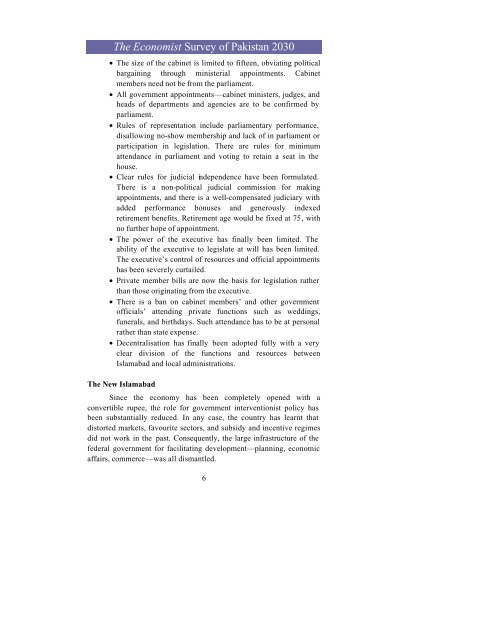economist-survey
economist-survey
economist-survey
You also want an ePaper? Increase the reach of your titles
YUMPU automatically turns print PDFs into web optimized ePapers that Google loves.
The Economist Survey of Pakistan 2030<br />
• The size of the cabinet is limited to fifteen, obviating political<br />
bargaining through ministerial appointments. Cabinet<br />
members need not be from the parliament.<br />
• All government appointments—cabinet ministers, judges, and<br />
heads of departments and agencies are to be confirmed by<br />
parliament.<br />
• Rules of representation include parliamentary performance,<br />
disallowing no-show membership and lack of in parliament or<br />
participation in legislation. There are rules for minimum<br />
attendance in parliament and voting to retain a seat in the<br />
house.<br />
• Clear rules for judicial independence have been formulated.<br />
There is a non-political judicial commission for making<br />
appointments, and there is a well-compensated judiciary with<br />
added performance bonuses and generously indexed<br />
retirement benefits. Retirement age would be fixed at 75, with<br />
no further hope of appointment.<br />
• The power of the executive has finally been limited. The<br />
ability of the executive to legislate at will has been limited.<br />
The executive’s control of resources and official appointments<br />
has been severely curtailed.<br />
• Private member bills are now the basis for legislation rather<br />
than those originating from the executive.<br />
• There is a ban on cabinet members’ and other government<br />
officials’ attending private functions such as weddings,<br />
funerals, and birthdays. Such attendance has to be at personal<br />
rather than state expense.<br />
• Decentralisation has finally been adopted fully with a very<br />
clear division of the functions and resources between<br />
Islamabad and local administrations.<br />
The New Islamabad<br />
Since the economy has been completely opened with a<br />
convertible rupee, the role for government interventionist policy has<br />
been substantially reduced. In any case, the country has learnt that<br />
distorted markets, favourite sectors, and subsidy and incentive regimes<br />
did not work in the past. Consequently, the large infrastructure of the<br />
federal government for facilitating development—planning, economic<br />
affairs, commerce—was all dismantled.<br />
6




